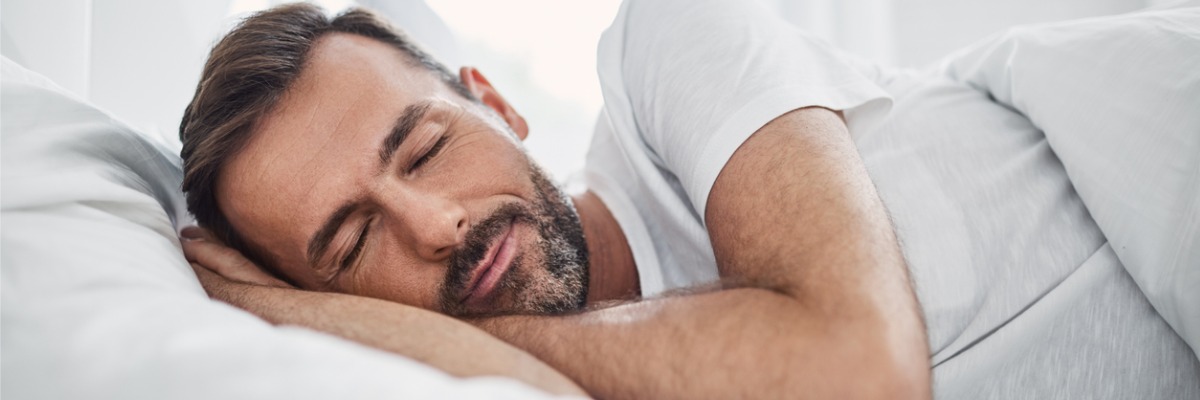How to Fall Asleep and Stay Asleep All Night

Do you often find yourself tossing and turning in bed? Do you struggle to get a good night’s sleep? Is getting eight hours of rest nothing more than a pipe dream? If so, you’re not alone. Approximately 70 million Americans have a chronic sleep problem. If you are one of them, the following tips may help you fall asleep fast and stay asleep all night.
7 Tips for Staying Asleep All Night
Waking up in the middle of the night is incredibly frustrating. You finally drift off to sleep, only to be awakened a few hours later. For many people, falling asleep and staying asleep may be a real challenge. However, adding these seven tips to your sleep routine may significantly improve your chances of restful slumber.
1. Establish a Regular Sleep Schedule
Your body’s internal clock is very powerful and will naturally adjust to set patterns. So, if you go to bed and wake up at the same time every day, you are more likely to feel sleepy when it’s time for bed and awake when it’s time to start your day.
Of course, life happens, and sometimes you can’t stick to your sleep schedule 100% of the time. However, try to stick as close to your schedule as possible. This will help train your body to sleep better. Moreover, napping may make it harder to fall asleep at night because it disrupts your natural sleep rhythm. If you have trouble falling asleep at night, avoid taking naps during the day. If you can’t avoid a nap, try limiting it to 30 minutes or less and ensure it’s earlier in the day.
2. Create a Relaxing Sleep Environment
Even minor disturbances in your sleeping environment may have a major impact on your sleep quality. To help you get the best sleep possible, take some time to assess and optimize your sleep space. Make sure your bedroom is dark, quiet, and cool. Consider using blackout curtains, earplugs, or a white noise machine to create an ideal environment for sleeping.
You should also make sure your bed is comfortable and provides the proper support. If you often wake up with aches and pains, it may be time to invest in a new mattress or pillow. Furthermore, having clean sheets may also help you sleep better. Be sure to wash your sheets regularly and keep them free of allergens, dust, and other irritants.
3. Wind Down Before Bedtime
In addition to creating an ideal sleep environment, it’s important to give your body and mind time to wind down before bedtime. Limit exposure to bright screens, such as computers, tablets, and phones, in the hours leading to sleep. The blue light emitted by these devices can suppress melatonin production and make it harder to fall asleep. Instead of looking at a screen before bed, try reading a book or taking a relaxing bath.
You may also want to avoid working or doing other mentally-stimulating activities in the bedroom. The bedroom should be a space for relaxation and sleep, not work or stress. Set an alarm to remind you to start winding down 30-60 minutes before your desired bedtime. This way, you have plenty of time to relax and fall asleep.
4. Avoid Caffeine and Alcohol Before Bed
Caffeine is a stimulant that may make it hard to fall asleep. If you’re struggling to sleep at night, avoid drinking caffeinated beverages in the afternoon and evening. On the other hand, alcohol may help you fall asleep initially, but it will cause you to wake up later and impact the quality of your sleep.
Alcohol interferes with your rapid eye movement (REM) sleep, which is the deepest stage of sleep. REM sleep plays a critical role in how well you feel when you wake up. So, if you’re wondering how to stay asleep all night, it’s best to avoid alcohol before bedtime.
Drinking alcohol before bed will likely leave you feeling tired and groggy in the morning. If you choose to consume caffeine or alcohol, try to do so earlier in the day and limit your intake. This may give your body time to metabolize these substances and avoid disrupting your sleep at night.
5. Get Up and Move During the Day
Leading an active lifestyle is essential for good sleep. Exercise helps promote deep, restful sleep by reducing stress and anxiety levels. It also helps improve the quality of your sleep by regulating your body temperature. Any amount of activity is better than none at all, but you should aim for at least 30 minutes or more of moderate-intensity exercise per day.
Exercising helps your body release pent-up energy so you may sleep better at night. If you are not used to exercising, start slowly and gradually increase the intensity and duration of your workouts.
6. Practice Relaxation Techniques
Nearly 20% of people occasionally have insomnia issues. To potentially reduce the frequency and severity of your sleepless nights, practice relaxation techniques such as deep breathing exercises, stretching, or progressive muscle relaxation. If you’re having difficulty falling asleep, try a relaxation technique before bed. You may also want to practice these techniques during the day to reduce stress levels.
7. Try Using Sleeping Aids
The solution to how to stay asleep all night may also lie in using sleeping aids. If you’re still struggling to sleep after making lifestyle changes and practicing relaxation techniques, you may need to consider using sleeping aids. There are several types of sleeping aids available. Some sleeping aids are over-the-counter, while others require a prescription. Before taking any sleeping aids, it’s essential to talk to your doctor about the potential risks and benefits. They can help you choose a sleeping aid that is suitable for you and your needs.
Treat Hormone-Related Sleep Issues
If you have trouble falling asleep and staying asleep, your hormones may be to blame. Outset is dedicated to helping people feel their best by providing natural hormone therapy solutions. If you are a patient, we encourage you to talk with your healthcare provider about healthy aging and ask if they have a comprehensive healthy aging solution to fight the symptoms of hormone imbalance.
If you are a healthcare professional and think your patients may benefit from our healthy aging programs, contact us today to learn more about how you can partner with us.
